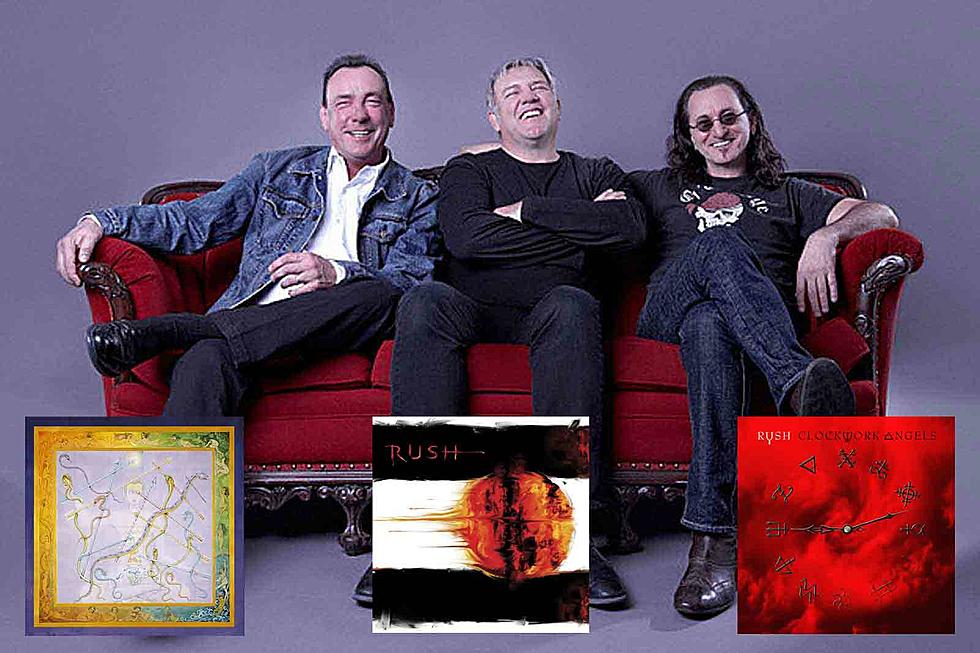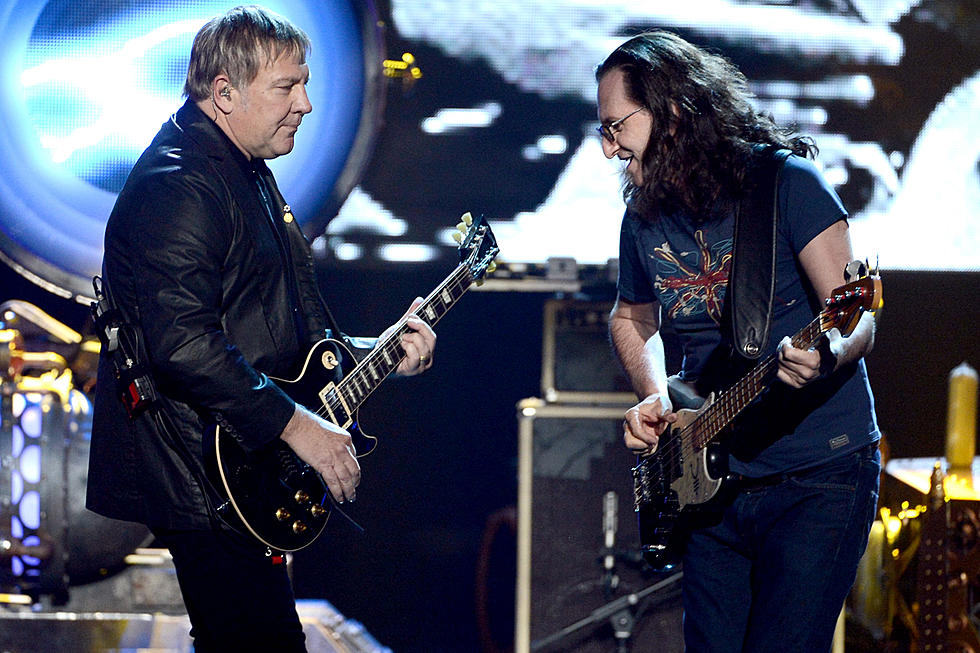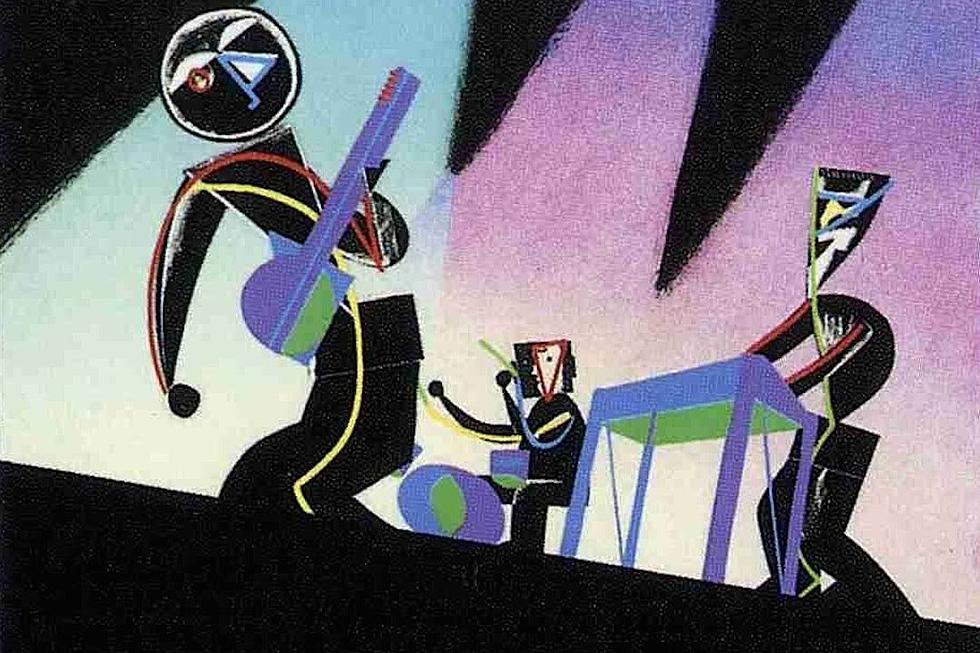
How to Make the Perfect LP From Rush’s Last Albums
Alex Lifeson seemingly closed the casket on Rush in January 2018, telling The Globe and Mail that the groundbreaking prog-rock band is "basically done."
Fans mourned as the guitar icon added, almost cruelly, “We have no plans to tour or record any more. ... After 41 years, we felt it was enough." Singer Geddy Lee busied himself for a time writing books, and then drummer and lyricist Neil Peart passed away after a quiet battle with brain cancer.
With the band now gone quiet, what are Rush geeks supposed to do? Say a farewell to kings? Not a chance. If they won't give us another album, we'll simply devise our own. For this playlist, we looked back at the band's final trio of LPs – 2002's Vapor Trails, 2007's Snakes & Arrows and 2012's Clockwork Angels – and created the ultimate mixtape: all of the anthems, none of the filler.
This particular period is worth reassembling. Vapor Trails, which arrived after their longest drought of six years, failed to meet expectations of a rabid fan base – leaning awkwardly into the heavy alt-rock sounds that flourished in the early '00s. They rebounded with their next two records, recapturing their prog zeal on Snakes & Arrows and marrying that instrumental prowess into (mostly) compact songs on Clockwork Angels.
But a bundled package of highlights would trump anything they released since their late-'70s/early-'80s peak.
So, how do you make the perfect LP from Rush's last albums? In this case, we've arranged the results in reverse chronological order below.
"Clockwork Angels," Clockwork Angels (2012)
Clockwork Angels, Rush's triumphant 19th LP, ended their career with concept-album grandiosity and melodic accessibility. The title track epitomizes that duality: The arrangement shifts from a distorted assault to chiming, atmospheric riffs, and Lee's harmony-heavy vocal imbues the fantasy lyrics with a warmth rare in prog. "Clockwork angels, spread their arms and sing," he belts. "Synchronized and graceful, they move like living things." They do indeed.
"Headlong Flight," Clockwork Angels (2012)
After 18 albums of heavy guitar and bass riffs, you're bound to accidentally borrow from yourself once or twice. Or in the case of "Headlong Flight," a bruising centerpiece from Rush's swan-song LP, intentionally. "What was it that Oscar Wilde said: Self-plagiarism is style?" the late Peart mused in a 2012 Classic Rock interview. "We certainly do a few tongue-in-cheek nods to [1975's] 'Bastille Day' in ‘Headlong Flight.' That's deliberate." Regardless, the revisionism was worthwhile. The song – which evolved out of a jammy instrumental called "Take That Lampshade Off Yo Head!" – recycles that vintage spirit into a rabid punk-metal snarl.
"The Wreckers," Clockwork Angels (2012)
For such a simple, dreamy rocker (at least by Rush standards), "The Wreckers" has a surprisingly complicated backstory. The orchestra-adorned cut, lyrically inspired by Daphne du Maurier's 1936 novel Jamaica Inn, found the group experimenting on its original demo by instrument swapping. "We were on a break and Ged picked up one of my guitars and he started messing around, and I remember he got up and came back with some lyrics," Lifeson told Classic Rock. "Then he sat in the corner playing the melody for the verses and I thought, ‘Wow, this sounds great.’ He just wanted to put it down very quickly and I grabbed his bass and we ended up recording the demo with him playing guitar and me playing bass— it was great! He played on the record, but it's my bass part, which is really cool. When we swap instruments, we sound like Barenaked Ladies, which was a surprise. We had to Rush-ify the song." But even after writing their initial parts, the trio struggled to piece together the arrangement in the studio – from the strings to the clean guitar strumming that anchors the verses. "[It] has a real pop feel," Lifeson told MusicRadar in 2012. "It’s not heavy, but it’s emotionally tied to a strong rock presence. The verses are some of my favorite Rush moments ever.”
"The Garden," Clockwork Angels (2012)
Rush have always offered more than sci-fi narratives and pile-driving riffs. Many fans overlook or forget about their soft side – from the thoughtful parable of "The Trees" to the heartbreaking power ballad "The Pass," which reflects on teenage suicide. "The Garden," the final track on what could be their final LP, carries on that lineage of sensitivity: Lee croons over a lush David Campbell string arrangement, a muted bass, Jason Sniderman's cascading piano and Lifeson's acoustic strum. Producer Nick Raskulinecz initially worried the band was pushing that gentleness too far, but Lifeson told MusicRadar in 2012 that they wanted to keep the song "simple and heartfelt." "The sentiment was very much about being at the end, of being retrospective," he said, "so there had to be a sweetness to it."
"Wish Them Well," Clockwork Angels (2012)
The greatest Rush albums showcase the subtle variations of their sound – full-blown prog instrumentals coexisting with airy ballads and hard rockers. "Wish Them Well" falls in the latter category, with the trio stripping away any hint of excess in favor of surging major chords, belted backing vocals and a drum part so restrained you'd think someone taped one of Peart's arms behind his back.
"Caravan," Clockwork Angels (2012)
"I can't stop thinking big!" Lee yelps, fittingly, on this jolting battering-ram rocker. "Caravan" tells the story of a young man whose romantic view of the world sends him on a journey of self-discovery. But that lyric could also describe the band's majestic vision: Across a tight five and a half minutes, they voyage from crunchy funk-metal riffs to a spacey chorus atmosphere to a face-melting Lifeson solo.
"Faithless," Snakes & Arrows (2007)
"I don’t have faith in faith / I don’t believe in belief / You can call me faithless," Lee sings, channeling one of Peart's most distinctly moving messages. "But I still cling to hope / And I believe in love / And that's faith enough for me." Rock music is full of spiritual proclamations, but it's empowering to hear a major band approach atheism with the same reverence. The music is equally powerful, from the droning verse riffs to the surge of cinematic chorus strings from longtime Rush friend Ben Mink.
"Hope," Snakes & Arrows (2007)
Every Rush album needs an instrumental, and our fake Rush album is no exception. But unlike, say, the signature full-band bombast of "YYZ," this two-minute piece – the shortest in the band's catalog – spotlights Lifeson's acoustic 12-string guitar in folky mode. (A live version of the song, recorded for Songs for Tibet: The Art of Peace, earned a 2009 Grammy nomination. Apparently the Academy isn't a big fan of Lee as a singer: The band has earned six nods for instrumental tracks but not one for a vocal cut.)
"Far Cry," Snakes & Arrows (2007)
Magic from the first mammoth power chord, "Far Cry" is peak modern Rush in every sense. The arrangement showcases each member equally – check Peart's dancing hi-hats and Lee's soulful bass on the verses, or the way Lifeson alternates between a bluesy crunch and phased textures. But it's more than just virtuosity here: Lee's vocal melody unfurls hook after hook, peaking with the descending slide into "I can get back on."
"Bravest Face," Snakes & Arrows (2007)
Lee doles out some trademark Peart wisdom on this quirky, melancholy track. "In the sweetest child there's a vicious streak / In the strongest man there's a child so weak," he sings over ringing guitars. "In the whole wide world there's no magic place / So you might as well rise, put on your bravest face / Put on your bravest face." It's vintage Rush on one level, but there are unique moments scattered throughout – from the raw blues touches on the guitar solo to the way Lee bends his voice into a blue-eyed-soul croon at the end.
"How It Is" Vapor Trails (2002)
This Vapor Trails anthem documents the doldrums of being caught "between how it is and how it ought to be." The weather changes ("It's such a cloudy day / Seems we'll never see the sun"), but our protagonist's "lack of imagination" won't let them peer through the storm toward life's inevitable ebb and flow. It's a lyric about the gulf between depression and inspiration, and it's paired to an appropriately dynamic arrangement – frayed, metallic verses and sugary, acoustic adult-contemporary choruses. It's the circle of life, Rush-style.
"Vapor Trail," Vapor Trails (2002)
Rush really made quite a racket for a trio, didn't they? Can you imagine a fourth person trying to slip into the crevices of "Vapor Trail" between Lee's chordal bass, Lifeson's chiming chords and Peart's jazzy tom fills and marching band snare? "Silence all the song birds / Stilled by the killing frost," Lee sings. "Forests burn to ashes / Everything is lost / Washed away like footprints in the rain." A joyous din, paired with bittersweet words.
"Earthshine," Vapor Trails (2002)
Non-completists can skip Rush's middle-of-the-road 17th LP – with the exception of a few choice cuts. "Earthshine" is among the band's heaviest and heartiest latter-day songs, built on a spooky alt-grunge riff and a stutter-stepping chorus full of layered, psychedelic guitar. Unlike many of his guitar-hero prog peers, Lifeson never had to play 10 notes per second to sustain a mood – his textural tonal web on the post-chorus ranks among his most elegant moments.
More From Ultimate Classic Rock









